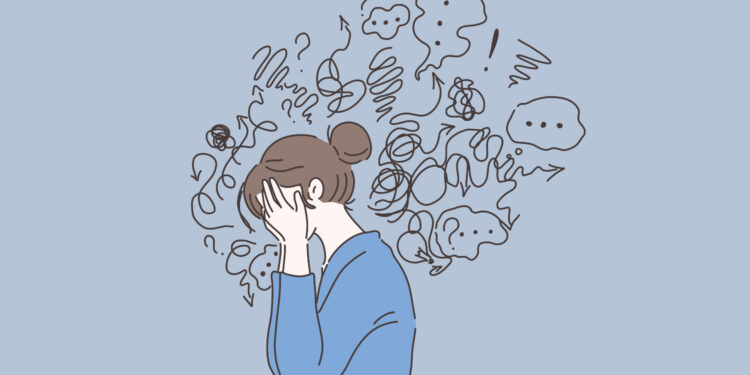Are you experiencing feelings of continuous sadness or a lack of motivation as of late? The mental health disorder known as depression is a severe ailment that affects millions of individuals all over the globe.
One of the first steps in improving one’s mental health and seeking assistance is to become aware of the symptoms that are associated with depression.
Ten Essential Depression Indicators
Depression is a severe mental health disorder affecting millions worldwide. Recognizing its symptoms is crucial for seeking help and improving mental health.
- Persistent Sadness: Continuous and overwhelming melancholy impacting daily life.
- Loss of Interest: Decreased enjoyment in previously pleasurable activities.
- Appetite Changes: Significant weight loss or gain due to altered appetite.
- Sleep Disturbances: Insomnia or excessive sleeping.
- Fatigue: Persistent exhaustion making daily tasks overwhelming.
- Feelings of Worthlessness: Overwhelming guilt and self-doubt.
- Concentration Issues: Difficulty focusing, making decisions, or remembering.
- Physical Aches: Unexplained headaches, back pain, or stomach issues.
- Irritability: Increased frustration or anger.
- Suicidal Thoughts: Recurring thoughts of self-harm or suicide, requiring immediate professional help.
1Chronic Sadness: Overwhelming Melancholy in Daily Life
Chronic melancholy is a sign of depression. It entails persistent sadness. Chronic sorrow may influence a person’s employment, relationships, and everyday life. Unlike the brief melancholy everyone feels, this sadness lasts weeks, months, or longer without an obvious cause.
It may cause despondency and despair, making it hard to find pleasure or inspiration. Physical symptoms include weariness, eating changes, and sleep difficulties from ongoing emotional suffering. This symptom must be identified to get assistance and start recovery.
Impact and Signs
- Feeling emotionally numb prevents people from feeling joy or happiness.
- Social withdrawal: They may distance themselves from friends and relatives.
- Sadness impairs focus and decision-making.
- Physical Symptoms: Chronic weariness, headaches, and stomach disorders commonly accompany this emotional condition.
Coping and Treating
Professional aid is crucial. CBT, medication, and lifestyle modifications, including exercise, good food, and social support, may help symptoms. Depression-related sorrow may be managed with early intervention and regular therapy.
Understanding and accepting these symptoms is the first step to recovery from depression. If you or someone you know is depressed, get professional treatment.
2Loss of Interest: Decreased Enjoyment in Previously Pleasurable Activities
One of the most common symptoms experienced by individuals struggling with mental health challenges is a profound loss of interest or decreased enjoyment in activities that were previously pleasurable. This phenomenon, known as anhedonia, can be a debilitating aspect of conditions like depression, anxiety, trauma, and certain mood disorders.
For those affected, activities they once found fulfilling, exciting, or even just mildly enjoyable can suddenly become devoid of any sense of pleasure or meaning. Simple tasks like socializing with friends, pursuing hobbies, or engaging in recreational activities can feel like monumental chores, drained of all their former appeal.
This loss of interest can have far-reaching consequences for an individual’s quality of life. As once-rewarding activities lose their luster, it becomes increasingly difficult to find motivation, maintain a sense of purpose, and cultivate feelings of happiness and satisfaction. The resulting sense of apathy and disengagement from life can exacerbate the underlying mental health condition, creating a vicious cycle.
Potential causes of this symptom can include neurochemical imbalances, disruptions in the brain’s reward pathways, the overwhelming effects of stress and trauma, and the self-reinforcing nature of negative thought patterns. Addressing the root causes through professional treatment, such as psychotherapy, medication, and lifestyle interventions, is crucial for restoring a person’s ability to experience joy and fulfillment.
It’s important to note that the experience of anhedonia is highly subjective and can manifest differently for each individual. Some may struggle to find any enjoyment in activities they once loved, while others may experience a more gradual, subtle decline in their ability to derive pleasure.
Compassionate support and understanding from loved ones, as well as self-compassion and patience, can be invaluable for those navigating this challenging symptom. With the right interventions and coping strategies, it is possible to rediscover a sense of engagement, motivation, and renewed appreciation for the activities that once brought joy and enrichment to one’s life.
3Alterations in appetite lead to significant shifts in body mass index
Many people who suffer from mental health conditions may have extreme swings in their hunger levels, which may cause them to either lose or gain a significant amount of weight. Interfering with the signals about hunger and fullness that the body sends forth may be detrimental to both mental and physical health.
Others could be completely uninterested in eating or even sick to their stomachs at the mere thought of it. An unplanned loss of weight may have a negative impact on one’s energy levels, impair the immune system, and create both physical and emotional suffering, which can exacerbate preexisting mental health conditions.
However, some people may experience weight gain as a result of obsessive appetite. Certain people may find that eating might assist them in coping with mental health issues such as depression, traumatic experiences, or mood disorders. It is possible for gaining weight to result in low self-esteem, problems with body image, and ongoing health problems.
In addition to the intricate brain-body connection, neurochemical imbalances, hormonal shifts, and the effects of medicine may all have an influence on hunger levels. The way that people feel about food and the frequency with which they consume it may be influenced by factors such as stress, anxiety, and mental health conditions.
These shifts in appetite usually require the assistance of a medical professional, psychotherapy, and information on nutrition. It may be possible to restore control and stability by reestablishing a healthy and balanced connection with one’s body and consumption of food. There is a possibility that this is a significant step.
Having a caring and nonjudgmental attitude is necessary in order to comprehend the factors that create fluctuations in hunger. People may be able to modify their eating habits and their self-image with the assistance of individualized therapy programs and supportive groups.
4Insomnia and excessive sleeping are both examples of sleep disturbances
Sleep disturbances are a common and troubling symptom of depression, manifesting as either insomnia or hypersomnia.
Insomnia
The inability to fall asleep or to remain asleep is a defining characteristic of insomnia. Individuals with depression often lie awake for hours, wake up frequently during the night, or rise too early in the morning. This lack of restorative sleep can exacerbate feelings of fatigue, irritability, and cognitive impairment, further hindering daily functioning.
Hypersomnia
Conversely, some individuals with depression may experience hypersomnia, or excessive sleeping. They might sleep for prolonged periods yet still feel exhausted. This excessive sleep can be a way of escaping feelings of sadness or hopelessness, but it often leads to missed responsibilities and a disruption in normal life routines.
Impact on Health
Both insomnia and hypersomnia can have significant impacts on physical health, contributing to weakened immune function, increased pain sensitivity, and a higher risk of developing chronic conditions such as diabetes and heart disease.
Managing Sleep Disturbances
In order to effectively manage sleep disorders, it is sometimes necessary to combine a number of different therapies. Cognitive Behavioral Therapy for Insomnia (CBT-I) is a highly effective approach that helps individuals change their sleep habits and thoughts about sleep. Medications, lifestyle changes, and creating a sleep-friendly environment can also be beneficial.
Addressing the underlying depression through therapy, medication, or a combination of both is crucial for improving sleep patterns. Regular exercise, a consistent sleep schedule, and relaxation techniques can also help manage sleep disturbances.
Recognizing and addressing sleep disturbances is a vital step in treating depression and improving overall well-being. If you or someone you know is struggling with sleep issues related to depression, seeking professional help is essential.
5Fatigue: Persistent Exhaustion Making Daily Tasks Overwhelming
Weariness is one of the most common and serious side effects of misery. Depression is characterized by a chronic exhaustion that does not improve with rest, in contrast to the normal tiredness that people experience.
It is possible for even the most basic activities, such as getting out of bed, taking a shower, or eating, to seem like an overwhelming challenge. This persistent weariness may have a negative impact on productivity and focus, which might result in difficulty working or attending school. In addition, a lack of energy may make emotions of worthlessness or guilt even more intense, generating a vicious loop that further exacerbates the melancholy mood.
Sometimes, in order to effectively manage tiredness, a complete treatment plan is required. This plan may include psychotherapy, medication, and changes in lifestyle that aim to enhance sleep, diet, and physical exercise.
6Feelings of Worthlessness: Overwhelming Guilt and Self-Doubt
Depression often causes a sense of worthlessness, marked by overwhelming guilt and self-doubt. People may think they’re not good enough, don’t deserve love, or can’t succeed. This often stems from negative self-perceptions and past experiences, leading to persistent rumination over perceived failures.
Such feelings can hinder daily functioning, affecting work, relationships, and personal well-being. Overcoming this requires professional therapy, support from loved ones, and sometimes medication to address the underlying depression and build self-esteem and resilience.
Recognizing and Addressing Worthlessness in Depression
- Negative Self-Talk: Constant internal criticism amplifies feelings of inadequacy.
- Past Mistakes: Obsessing over past errors or shortcomings reinforces self-doubt.
- Social withdrawal: Avoiding social interactions due to fear of judgment or rejection.
- Impaired Decision-Making: Difficulty making decisions, driven by fear of failure.
- Therapeutic Interventions: Cognitive-behavioral therapy (CBT) and other forms of counseling can help reframe negative thoughts.
- Support Systems: Encouragement from friends and family aids in rebuilding self-worth.
- Self-Compassion: Learning to treat oneself with kindness and understanding is crucial.
Addressing these feelings early through professional help and support networks can significantly improve one’s mental health and quality of life.
7Concentration Issues: Difficulty Focusing, Making Decisions, or Remembering
Depression often causes concentration problems that impair cognition. People may have trouble focusing at work, school, or home. This problem may cause project failure, diversions, or mental fog. Even basic decisions become difficult. Additionally, memory issues include forgetfulness and trouble remembering significant events. Cognitive deficits may increase frustration and powerlessness, worsening depression.
Trouble focusing
Depression makes it hard to focus on previously enjoyable activities. This may lower productivity and make you feel underachieving, which is especially frustrating in professional or academic contexts. The mind may wander, making work and discussions difficult.
Decision-Making Challenges Depression may impair judgment, making even little choices seem significant. Indecisiveness develops from lack of confidence and fear of bad results. It may disrupt everyday living, from eating to making life decisions, contributing to depression’s stress and worry.
Memory Issues
Depression may impair short-term memory, making information, dates, and appointments hard to recall. Frustrating forgetfulness may lead to missed duties and unreliability. Memory problems may cause confusion and disorientation.
Managing Focus Issues
Treating concentration difficulties requires medical and therapeutic methods. Mental health experts treat symptoms with medicines. Other counseling, like CBT, may work. Mindfulness, a healthy lifestyle, and a regular routine may improve cognition, attention, and decision-making.
Seeking Professional Help
If you or someone you know experiences these symptoms, see a mental health professional. Early treatment may improve cognition and quality of life.
8Physical Aches: Unexplained Headaches, Back Pain, or Stomach Issues
Depression doesn’t only affect the mind; it often manifests physically as well. It is possible for people who are suffering depression to have chronic and inexplicable bodily ailments, such as headaches, back pain, and stomach troubles. These symptoms are not always responsive to conventional treatment because their root cause is psychological rather than physical.
Chronic pain may make emotions of despair and tiredness worse, which can create a loop that leads to an increase in the severity of depression. It is necessary to address these physical symptoms as part of a complete treatment strategy, which highlights the need of getting expert assistance for optimal management and recovery.
Chronic Headaches
Lack of sleep Pain in the head that lasts for an extended period of time is a common physical manifestation of depression that many individuals may feel. There is a possibility that they might range from lesser headaches caused by stress to migraines that are much more severe. Muscular tension is one of the reasons that leads to severe headaches. This tension may be induced by the stress and anxiety that are often associated with depression.
Pain in the Back
Those who are suffering from depression often report experiencing back discomfort as another common ailment. There are a number of factors that might contribute to the discomfort, including mental and physical stress, bad posture as a result of weariness, and a lack of physical exercise, all of which are prevalent in people who experience depression.
Concerns pertaining to the Stomach
There is a connection between depression and digestive problems, which include things like pain in the stomach, cramps, bloating, and changes in the patterns of bowel movements. Because of the connection that exists between the nervous system and the digestive system, it is possible for psychological stress to have a significant impact on the health of the digestive system, which may lead to the manifestation of these unpleasant symptoms.
When it comes to providing effective treatment, it is very necessary to realize that these physical symptoms are related with depression. For rehabilitation to be effective, it is vital to have therapy that is all-encompassing and takes into account both mental and physical aspects of health.
9Irritability: Increased frustration or anger is a symptom of irritability
Irritability is a common but often overlooked symptom of depression. It manifests as heightened frustration, impatience, or anger, which may be uncharacteristic for the individual. This increased sensitivity can be triggered by minor inconveniences or stressors that wouldn’t typically provoke such a strong response.
For those experiencing depression, this irritability often stems from an underlying sense of hopelessness, fatigue, or chronic stress. The emotional strain can make it difficult to manage interactions and responsibilities, leading to conflicts in personal and professional relationships. Recognizing this symptom is crucial, as it can significantly impact an individual’s social dynamics and overall mental health. Seeking professional help can provide strategies to manage irritability and its effects.
Why It Happens
- Emotional Strain: Persistent feelings of sadness and hopelessness contribute to irritability.
- Fatigue: Constant tiredness lowers patience and increases sensitivity to stress.
- Cognitive Overload: Difficulty concentrating and making decisions can lead to frustration.
Impact on Daily Life
- Relationships: Increased arguments and misunderstandings with family, friends, and colleagues.
- Work Performance: Decreased productivity and potential conflicts with coworkers.
- Personal Well-being: Heightened stress levels and decreased ability to enjoy daily activities.
Managing Irritability
- Professional Help: Therapy and counseling to address underlying issues.
- Medication: Antidepressants may help stabilize mood.
- Self-Care: Regular exercise, a balanced diet, and sufficient sleep are all components of self-care.
- Stress Management: Mindfulness, meditation, and relaxation techniques.
Recognizing and addressing irritability as a symptom of depression is essential for improving overall mental health and quality of life.
10Suicidal Thoughts: Recurring Thoughts of Self-Harm or Suicide, Requiring Immediate Professional Help
Suicidal ideation, another term for suicidal thoughts, is a key indicator of depression. It is possible for these ideas to vary from momentary contemplation to serious plans for committing suicide. It is imperative that immediate action be taken in response to the fact that having recurrent thoughts of self-harm or suicide is indicative of a significant degree of suffering.
Why Suicidal Thoughts Occur:
- Severe Depression: Deep feelings of hopelessness and despair.
- Overwhelming Stress: Life events that seem insurmountable.
- Mental Health Disorders: Other conditions like anxiety or PTSD.
Recognizing the signs:
- Talking to someone about wanting to end their life or pass away.
- The expression of sentiments of despair or the absence of a reason to continue living.
- Withdrawal from friends, family, and activities.
- Drastic changes in mood or behavior.
Immediate Steps to Take:
- Please seek assistance by getting in touch with a mental health professional as soon as possible.
- Support System: Talk to trusted friends or family members.
- Emergency Services: If there is an immediate danger, call emergency services or go to the nearest emergency room.
Professional Treatment:
- Therapy: Cognitive-behavioral therapy (CBT) and other modalities.
- Medication: Antidepressants or other medications as prescribed.
- Support Groups: Peer support for shared experiences and coping strategies.
Suicidal thoughts are a medical emergency. Immediate professional help can provide the necessary support and treatment to address these critical symptoms and underlying issues. If you or someone you know is experiencing suicidal thoughts, take action without delay—your life or the life of someone else may depend on it.
Recommended:
Buy Portable Ultrasound Machines: Ultimate Guide to Top-Rated Devices
Seeking Assistance
If you or someone you care about exhibits any of these symptoms, it is imperative that you take action and seek assistance from a mental health expert. An individual may recover from depression and lead rewarding lives if they have the appropriate support and therapy. Depression is a medical condition that is able to be addressed.
Recognizing the symptoms of depression is essential for initiating therapy and intervention at an earlier stage. In the event that you or someone you know is experiencing these symptoms, do not be afraid to take action and seek assistance. Depressive symptoms are not an indication of a lack of strength; rather, they are a medical problem that calls for attention and treatment.



















